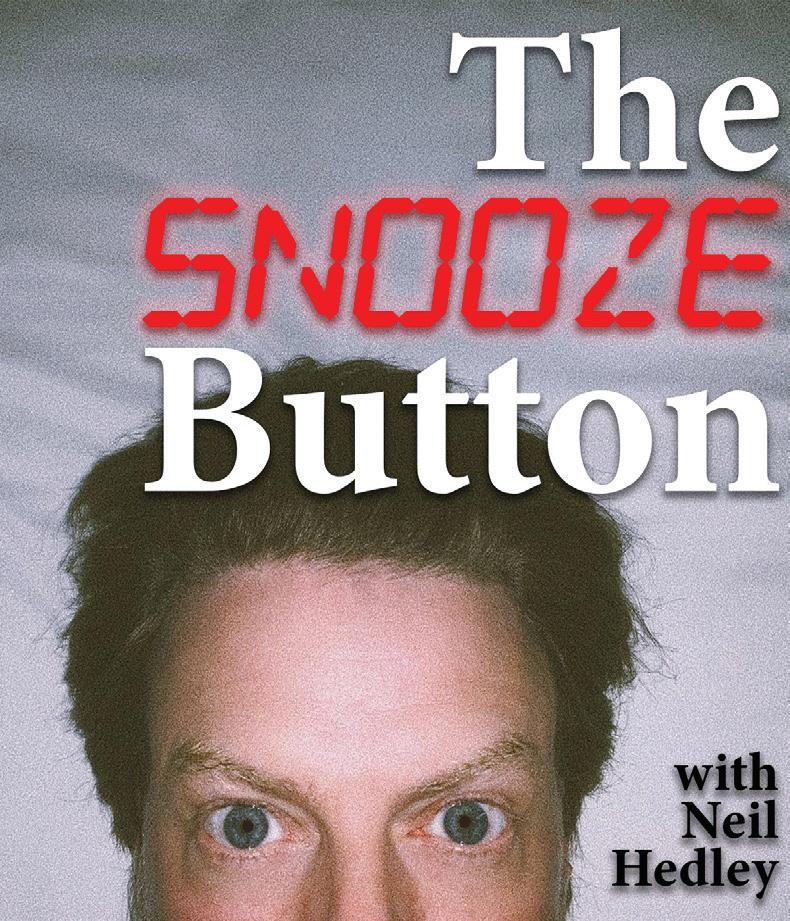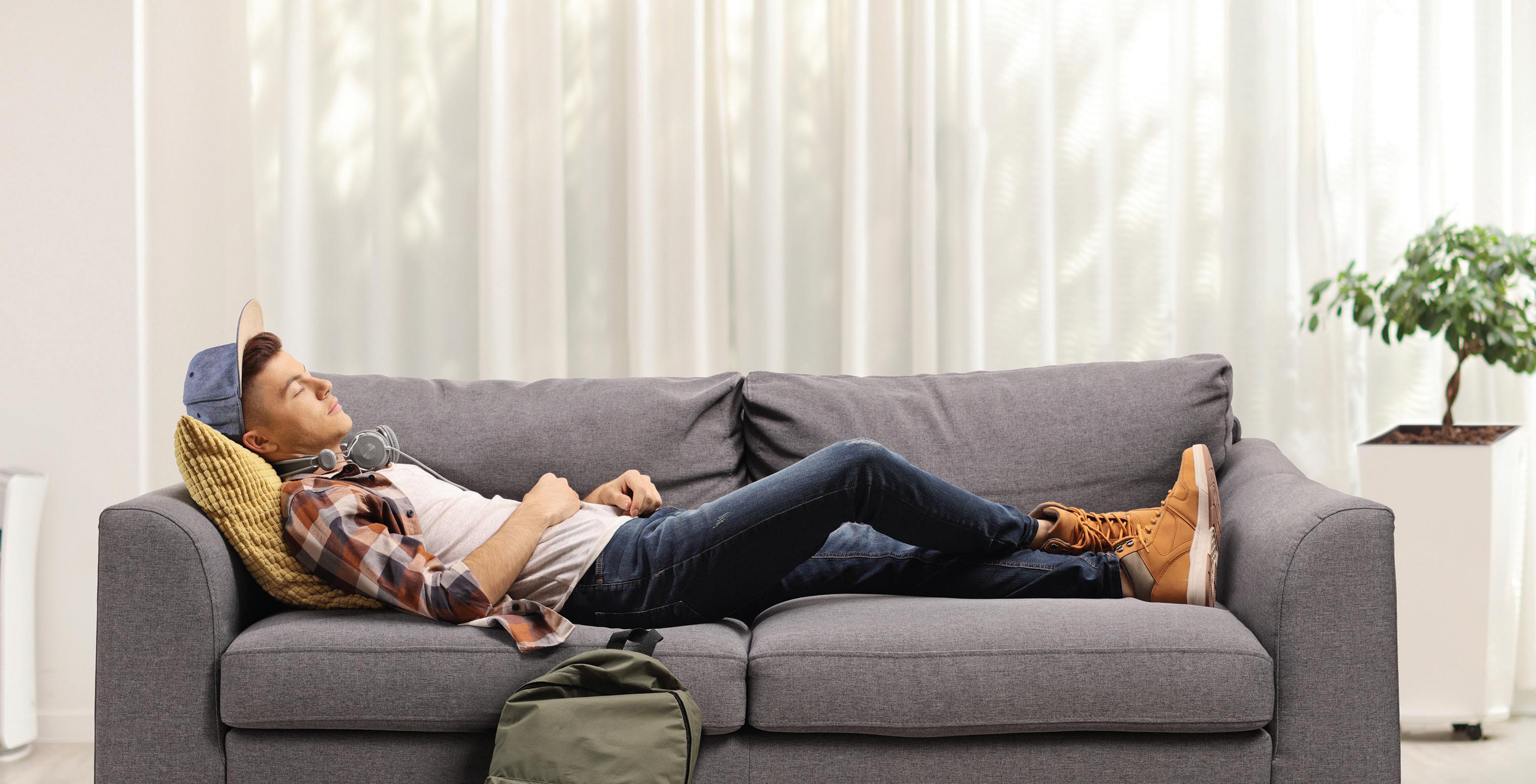
7 minute read
The Snooze Button
Chronic from page 11
The European Sleep Research Society also has published guidelines on the positive outcomes of using CBT-I for the treatment of insomnia. So what is it, and why isn’t it a more well-known form of treatment?
“I fear patients hear cognitive behavior therapy and assume it is a lengthy psychoanalytical process that can take years to work through, but it is not,” says Dr. Morin. “CBT-I is generally a 4-, 6- or 8-week process that puts the patient in the driver seat of the entire process. The healthcare professional is merely the coach encouraging the patient along the way. And when the program is followed, patients will likely see results because—as I want to reiterate—when dealing with a learned behavior, we can teach patients to unlearn it.”
The general idea of Cognitive Behavior Therapy for Insomnia is that personal feelings and attitudes affect everyday behavior. CBT-I teaches patients coping strategies and methods for dealing with life stressors. Dr. Morin adds, “However, if the insomnia is not yet chronic, or is triggered by one of those life stressors I mentioned, then one option is prescription medication. While medication should be seen as a temporary solution, I do want patients to be aware of all options, and know solutions are out there.”
TAKE ACTION
World Sleep Society has found that most sleep disorders are prevent able or treatable, yet less than one-third of sufferers seek profes sional help. For patients ready to be proactive about sleep health, the Society of Behavioral Sleep Medi cine offers an online directory of providers who treat sleep disorders, including insomnia.
Patient Organization Highlight
The Snooze Button
The Snooze Button—That’s the name of the podcast, the working title of the book and various other projects connected to the book. The man behind the button is Neil Hedley. Hedley explains, “I’m the host, producer, webmaster, social media guy, chief shoe polisher.”
According to Hedley, The Snooze Button is his attempt to fix a lifelong battle with insomnia in such a way that it also offers help to others with sleep issues by “helping them avoid all the horrible information that’s being shoved out onto the internet.” Hedley accomplishes this by talking to sleep experts and neuroscientists from around the world. But it’s way more than that. Hedley clarifies, “We’re also talking to celebrities and high achievers who have sleep challenges baked in to their everyday experience. How do you fall asleep when you’re on a concert tour that has you and your toddler sleeping in a different hotel every night for seven months? How do you fall asleep on the International Space Station? How do you fall asleep the night before “the big game” when you’re the starting quarterback tomorrow? When I get a sleep tip from those folks, I’ll try it out for two weeks myself, and share the actual data from my sleep tracker to determine which things worked and which things didn’t.”
The Snooze Button podcast series began with Hedley’s visit to a sleep lab in Toronto where he learned “just how little” he and his primary care doctor knew about one of the most basic yet critical processes of the human body.
So what does Hedley hope to gain from his podcast? A good night’s sleep. Or maybe several. Hedley states, “Sleep is at the heart of virtually everything our bodies do. There isn’t a single process in your body that can’t be improved by getting better sleep, but because sleep is something that eventually happens without much effort to everybody on the planet to one degree or another, we don’t pay it nearly enough attention.”
—thesnoozebutton.com
11
| healthiersleepmag.com
12
| healthiersleepmag.com
The BuZZZ about Sleep The Latest Buzzword is Sleep Divorce
When a couple stops sleeping in the same bed or bedroom in an effort to better sleep quality and quantity, such as when a member of the couple has a sleep disorder or works a night shift.
The term gained popularity in 2019 with a New York Times article, and again in 2020 when TV Host, Carson Daily, publicly spoke about his sleep divorce from his wife due to his sleep apnea.
5 Untruths We Believe About Sleep
The 94 classified sleep disorders are not always to blame
By Gina Dewink
In the world of medicine, Sleep Medicine is a relatively young subspecialty, but it’s evolving at a rapid Preserving pace. Sleep Medicine is a subspecialty of practice regular and research devoted to circadian understanding sleep and its complicated importance in rhythms has our overall health, as well been found to as treatments for the sleep disorders keeping you lower the risk of from a good night’s sleep. sleep disorders, The recent list of sleep mental health disorders, the International disorders and Classification of Sleep Disorders (ICSD-2), cites chronic health 94 known sleep disorders. But what if it’s not a sleep issues such as disorder keeping you obesity and awake? What if it’s just the misconceptions you diabetes. believe about your sleep? If you believe any of the untruths below, it may be time to rethink sleep.
I NEED 8 HOURS OF SLEEP PER NIGHT. [UNTRUE]
The truth is, even if you’re not getting that many hours (and studies show many of us are not), this is a myth disguised as a guideline. Sleep experts can only seem to agree that healthy sleep hours range from 6.68-10 hours of sleep per night, depending on the person. Your optimal sleep duration requirement is largely determined by heredity. And ‘Long Sleeper’ and ‘Short Sleeper’ are both listed as sleep disorders in the ICSD2, meaning you may need more or less than the standard eight.
I CAN TRAIN/TEACH MYSELF TO SLEEP LESS. [UNTRUE]
Because our heredity plays such a large part in our sleep needs, we are unable to train ourselves to sleep less. Though you may test various lengths of sleep to find your optimal amount, you will not be able to convince your body that less is needed. Sleeping your optimal amount is only one-third of the “magic.” Dr. Clete Kushida, MD, PhD, FAASM explains, “A truly restorative sleep depends on duration as well as continuity and depth of sleep.” It’s a three-pronged approach to obtaining the perfect amount of sleep.
I CAN SLEEP ANY TIME, AS LONG AS I GET THE HOURS IN. [UNTRUE]
Following your body’s circadian rhythms is important. This means sleeping at your body’s optimal and natural time. Preserving regular circadian rhythms have been found to lower the risk of sleep disorders, mental health disorders and chronic health issues such as obesity and diabetes.

Professor Debra J. Skene of the University of Surrey, UK has over 25 years research experience studying human circadian rhythms in health and disease. Dr. Skene explains, “Synchronization between our body clocks and the external environment ensures optimal timing of events. If there is misalignment between the circadian timing and behavior, such as during night shift
Untruths continued on page 14
13
| healthiersleepmag.com
Untruths from page 13
work or following travel across time zones, then one is sleeping and eating at the wrong time of day. This improve memory, cognitive function, academic perfor
has acute consequences (daytime sleepiness; reduced performance and increased risk of accidents) as well as long term consequences (increased risk of metabolic disorders, cancer).”
SLEEP DISTURBANCES ARE HARMLESS. [UNTRUE]
Untreated sleep disorders causing multiple wake-ups have been linked to several chronic diseases, mood disorders, anxiety and more. Poor sleep affects every aspect of life, including one’s vitality and general outlook. Symptoms of excessive daytime sleepiness predispose the growth of traffic accidents, traumatism in the workplace and the development of mental illness. In addition to the multitude of health risks that accompany sleep disturbances, a study by RAND found that lack of sleep is costing the U.S. economy $411 Billion dollars per year. The data can be found in droves, and it all explains why sleep disturbances have consequences many of us do not consider. Sleep disturbances should be placed at the same level as other
SLEEP IS A WASTE OF TIME. [UNTRUE]
In a culture that works 24/7, sleeping can seem like a low priority. But in reality, by sleeping your optimal amount, you will push yourself ahead by functioning your best.
Research shows again and again how sound sleep can health concerns.
mance in children, sports performance, mental health and even beauty.
But until we place sleep at the top of our priority list, it will always seem there just isn’t time for this routine activity. And that’s the hard truth about sleep.
Right Now in Sleep Science

Poor sleep can raise blood pressure and alter gut microbiome. A recent scientific study suggests that staying awake all night can lead to high blood pressure, though it’s not yet clear what mechanisms underlie the development of this conditions. Researchers from the University of Illinois at Chicago (UIC) have identified a connection between disrupted sleep and elevated blood pressure, as well as changes in the gut microbiome.
Physiological Genomics, 2020, Vol. 52, No.7
doi.org/10.1152/physiolgenomics.00039.2020
14
| healthiersleepmag.com









